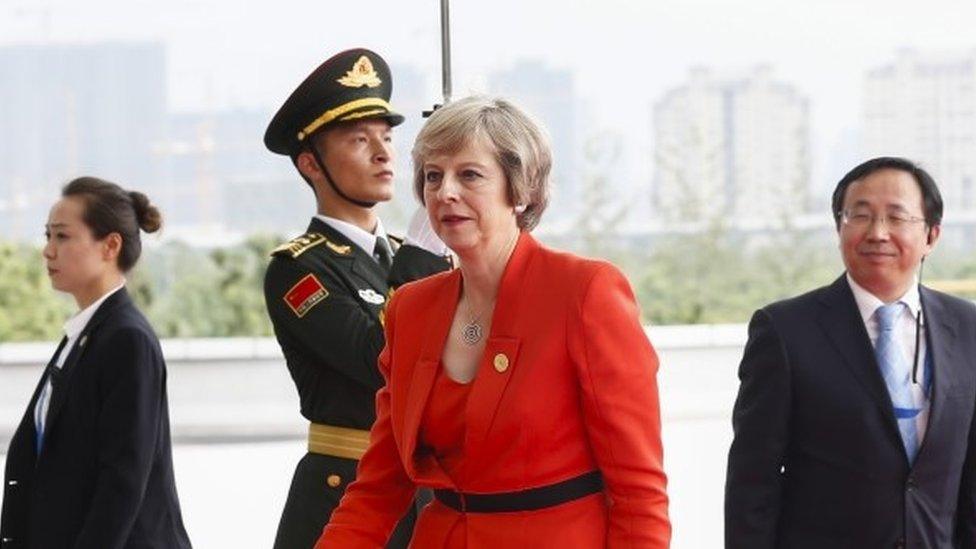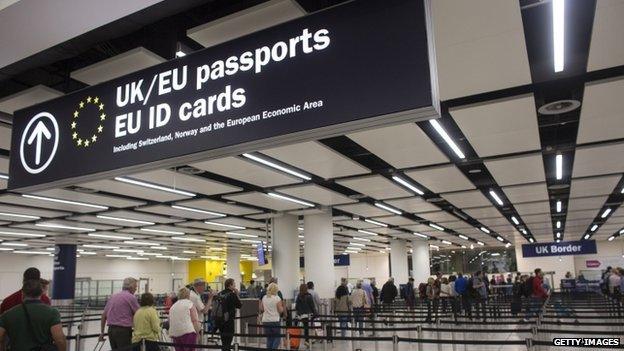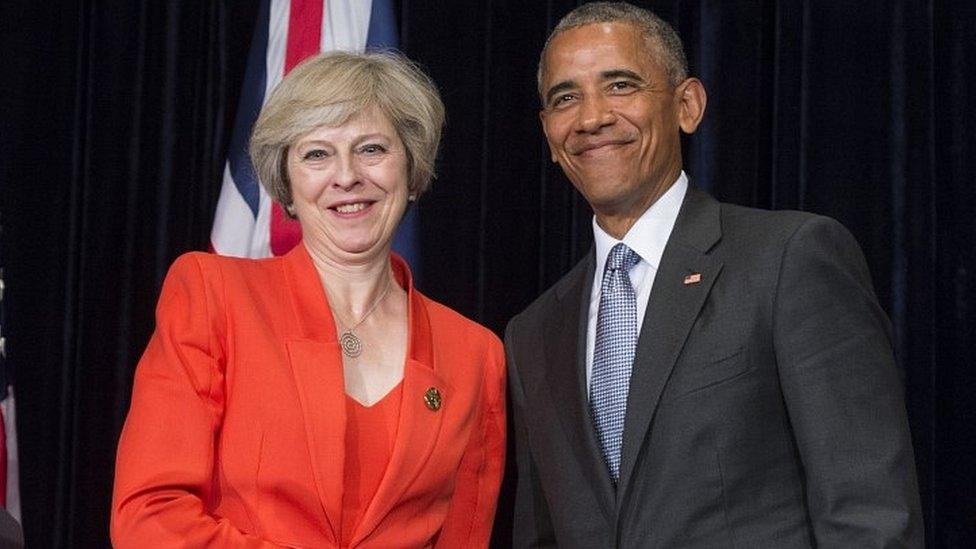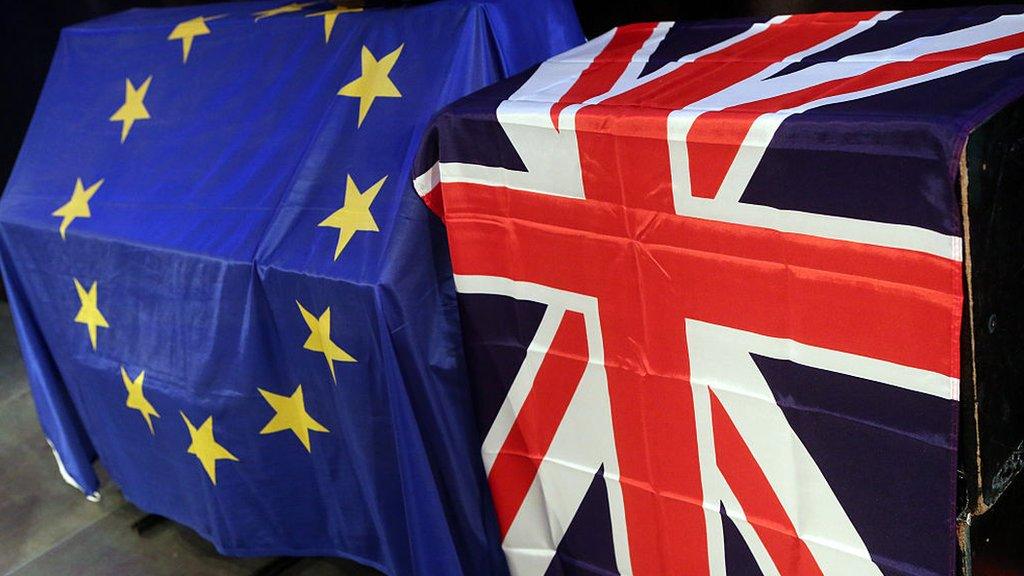Immigration: May rejects points-based system for EU nationals
- Published
- comments
Theresa May: "A points-based system does not give you control over immigration"
Theresa May has rejected a points-based system for controlling EU migration, one of the key promises of Leave campaigners during the referendum.
Speaking in China, the PM denied she had "gone soft" on migration and said people backed Brexit because they wanted "an element of control".
A points-based model would not let the government control arrivals, she said.
Ex-UKIP leader Nigel Farage said many people had voted Leave for the policy, backed by Boris Johnson among others.
Mrs May is attending the G20 summit of world leaders in Hangzhou, her first international summit as prime minister.
Although Mrs May supported remaining in the EU, she has said that the Brexit vote must be respected and suggested that curbs on the current free movement of EU citizens into the UK would be a red line in future negotiations with the EU.
But speaking to journalists in China she dismissed Vote Leave's proposal of an Australian-style points system for deciding the number of skilled and unskilled workers who could come into the UK every year from the EU and beyond - with numbers to be determined by MPs.
Rather than giving the government control, such a system would allow anybody into the UK if they met the criteria, she said, adding that curbs on student visas had been a more effective measure to reduce immigration.
"I want a system where the government is able to decide who comes into the country - I think that's what the British people want. A points-based system means that people come in automatically if they just meet the criteria," she added.
'Vote for control'
Her spokesman said: "The precise way in which the government will control the movement of EU nationals to Britain after Brexit is yet to be determined. However, as the PM has said many times in the past, a points-based system will not work and is not an option."
On Sunday Mrs May suggested a points-based model was not a "silver bullet", adding: "You have to look at the whole range of issues, not just how you bring control through the rules you have for people coming in, but also making sure you are rooting out abuse in the system and dealing with people if they are discovered here illegally."

Mrs May also indicated that EU citizens may continue to have preferential rights to live and work in the UK after Brexit.
She said people "wanted to see an ability to be able to control the movement of people from the European Union. And obviously that's what I say, not free movement as it has been in the past".
During a series of interviews, Mrs May also declined to guarantee the UK would use money saved by leaving the EU to spend another £100m a week on the NHS or cut VAT on energy bills.

Analysis

By Laura Kuenssberg, BBC political editor
The multiple red carpets have been rolled up and put away.
And at the end of the prime minister's first major summit there are questions that will follow her home. No more so than on how she really proposes to control immigration from the European Union. Having ruled out the points-based system that was promised by the winning side in the referendum, her answer on what might come instead? Simply, wait and see.
Downing Street officials are acutely aware they may come under increasing pressure to give more details. They face calls for clarity from allies too, as country after country expressed economic concerns about our planned departure.
But while it comes with political risk, at this summit the prime minister is displaying perhaps a significant contrast to her predecessor - choosing to work up the detail first, then make the decision, rather than make a decision and then make the details fit.

Mr Farage said he was "worried" by Mrs May's comments.
"The people were clear in wanting a points-based immigration system which is why so many went out and voted to leave the European Union," he said.
"Any watering down from that will lead to real anger."
Japan's ambassador to the UK says all options are open for companies after Brexit
Labour MP Chuka Umunna, who chairs Vote Leave Watch, which was set up by Remain campaigners after the referendum, said that, proportionally, immigration was higher in Australia, where a points-based system was in use.
He told BBC Radio 4's Today programme the prime minister could "square the circle" of getting the UK continued access of the single market but also ending "free movement as we know it", for example by only allowing immigration within the EU in respect of people who have a job offer.
Mrs May has faced pressure to sketch out a vision of what Brexit will mean for the UK's relations with key partners and major inward investors, such as the US and Japan.
Having held talks with US President Obama and Russian President Vladimir Putin on Sunday, she is meeting Chinese president Xi Jinping on Monday among other engagements before heading home.
In a briefing released to journalists on Sunday, the Japanese government expressed concern about the impact of the UK leaving the EU on its firms' tariff-free access to the single market and their ability to recruit highly-skilled workers for its UK plants.
The country's ambassador to the UK, Koji Tsuruoka, told Today it was hard to imagine Japanese companies pulling out entirely from the UK, but said "all options" would be open to businesses if export conditions worsened as a result of Brexit.
In his first Commons statement in his new job, Brexit Secretary David Davis told MPs the government wanted to "build a national consensus" for its EU negotiations.
The process would be an "exciting and considerable challenge", he said, adding that the government would "take the time to get it right".
"Naturally, people want to know what Brexit will mean," he said.
"Simply, it means leaving the European Union."
Almost two-thirds of UK adults are positive about a post-Brexit Britain, a poll suggests.
The Commons will also debate a public petition calling for a re-run of the EU referendum which has attracted more than four million signatures.
A poll for BBC Radio 5Live, conducted by the polling firm ComRes, suggests 62% of the 1,032 British adults canvassed say they are positive about Britain's future post-Brexit.
On the other hand, 26% of those spoken to have considered leaving the UK and moving elsewhere - including 43% of 18-34 year olds.
- Published4 September 2016

- Published28 March 2017

- Published30 December 2020
